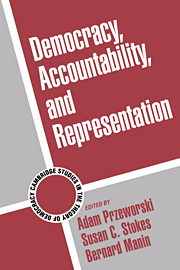Book contents
- Frontmatter
- Contents
- List of Contributors
- Introduction
- Part One Elections, Accountability, and Representation
- 1 Elections and Representation
- 2 Electoral Accountability and the Control of Politicians: Selecting Good Types versus Sanctioning Poor Performance
- 3 What Do Policy Switches Tell Us about Democracy?
- 4 Accountability and Authority: Toward a Theory of Political Accountability
- 5 Accountability and Manipulation
- 6 Party Government and Responsiveness
- 7 Democracy, Elections, and Accountability for Economic Outcomes
- Part Two The Structure of Government and Accountability
- Part Three Overview
- Author Index
- Subject Index
6 - Party Government and Responsiveness
Published online by Cambridge University Press: 05 June 2012
- Frontmatter
- Contents
- List of Contributors
- Introduction
- Part One Elections, Accountability, and Representation
- 1 Elections and Representation
- 2 Electoral Accountability and the Control of Politicians: Selecting Good Types versus Sanctioning Poor Performance
- 3 What Do Policy Switches Tell Us about Democracy?
- 4 Accountability and Authority: Toward a Theory of Political Accountability
- 5 Accountability and Manipulation
- 6 Party Government and Responsiveness
- 7 Democracy, Elections, and Accountability for Economic Outcomes
- Part Two The Structure of Government and Accountability
- Part Three Overview
- Author Index
- Subject Index
Summary
Political scientists have long written about the prospects of party government – democratic governance wherein citizens choose between programmatic parties to achieve the public policy they desire. They have written, in the main, in a context of concern whether anything might mediate citizen preferences into policy, often with the view that parties represented the best hope in a not very promising scenario. This work has a tone that is both wistful and gloomy: wistful because programmatic parties, if only they could spring to life, offer a neat package by which policy responsiveness might be facilitated, gloomy because the prospect for programmatic parties runs afoul of American politics and culture, a dream of the ideal polity only to be realized elsewhere.
In this chapter I revisit this familiar theme, asking whether programmatic political parties can be the mechanism by which citizen preferences become translated into public policy. The topic is worth another visit because (1) the programmatic parties we have prescribed for fifty years seem at last to be an emerging reality of American politics, and (2) we have evidence in hand that responsiveness of a longitudinal sort seems to work, and work pretty impressively. The present context, neither wistful nor gloomy, turns the question on its head. Given the existence of programmatic parties, and given the fact of dynamic responsiveness of public policy to citizen preferences, we can ask the more normal scientific question, Are parties the mechanism by which the translation occurs?
- Type
- Chapter
- Information
- Democracy, Accountability, and Representation , pp. 197 - 221Publisher: Cambridge University PressPrint publication year: 1999
- 28
- Cited by



